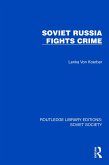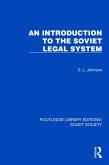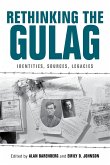With an introduction by George Woodcock.Nearly a century has passed since Kropotkin wrote In Russian and French Prisons, yet his criticisms of the penal system have lost none of their relevance. Prisons- far from reforming the offender, or deterring crime- are, in themselves, "e;schools of crime"e;. Every year, thousands of prisoners are returned to society without hope, without a trade, or without nay means of subsistence, and statistics show that once a man has been in prison he is likely to return. Moreover, the new offense is likely to be more serious than the first.Although Kropotkin makes extensive use of the memoirs of former prisoners and the works of contemporary penologists, it is his own experience in prison--he spent five years behind bars, two in Russia, three in France--that gives this book its power. He shows from first hand knowledge the immense human suffering caused by prison life: how it destroys the mind and body, how it degrades and humiliates, how it perverts the prisoner's character and robs him of his dignity, how it reduces him to the condition of a caged animal, how his whole life is subjected to a deadly mechanical routine, how everything is done to break his spirit and kill his inner strength.In Russian and French Prisons is the 6th volume of The Collected Works of Peter Kropotkin.Table of ContentsIntroduction to the 1991 edition by George WoodcockAuthor's preface to the Russian edition (1906)IntroductionI. My first acquaintance with Russian prisonsII. Russian prisonsIII. The fortress of St. Peter and St. PaulIV. Outcast RussiaV. The exile in SiberiaVI. The exile of SakhalinVII. A foreigner in Russian prisonsVIII. In French prisonsIX. On the moral influence of prisons on prisonersX. Are prisons necessary?Appendix A- Trial of the Soldiers accused of having carried Letters from Alexis RavelinAppendix B- On the part played by the Exiles in the Colonization of SiberiaAppendix C- Extract from a Report on "e;Administrative Exile,"e; read by M. Shakeeff at the Sitting of the St. Petersburg Nobility on February 17, 1881Appendix D- On Reformatories for Boys in France1991: 387 pages, index
Dieser Download kann aus rechtlichen Gründen nur mit Rechnungsadresse in A, B, BG, CY, CZ, D, DK, EW, E, FIN, F, GR, HR, H, IRL, I, LT, L, LR, M, NL, PL, P, R, S, SLO, SK ausgeliefert werden.









